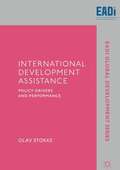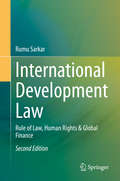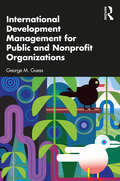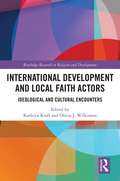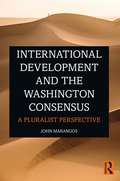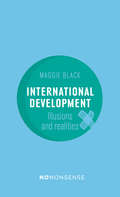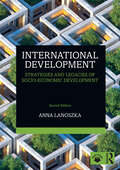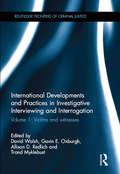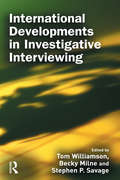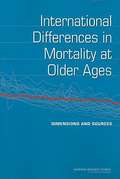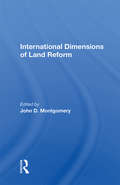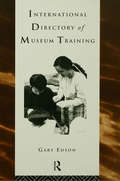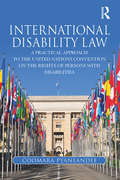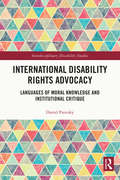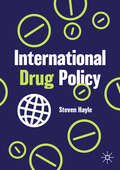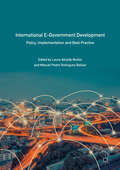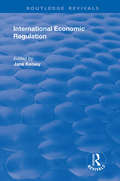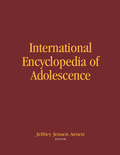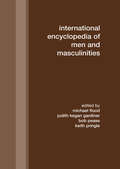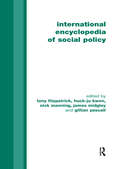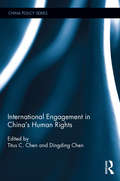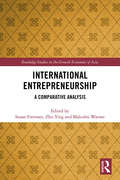- Table View
- List View
International Development Assistance: Policy Drivers and Performance (EADI Global Development Series)
by Olav StokkeThis book provides a comprehensive search for the basic political drivers of international development cooperation, based on the policy and performance of the OECD countries from the early 1960s to the present. The author focuses on the stated and implemented policies of the four so-called frontrunners and the Western hegemon, scrutinizing the changing trends in the justifications, objectives and guidelines set for the policy and their evolving performance vis-à-vis the international ODA target. Through extensive research, the work examines predominant world-views, societal value systems and foreign policy traditions, in order to find the policy drivers that vary nation to nation and how development assistance has evolved globally.
International Development Law: Rule of Law, Human Rights & Global Finance (International Economic Development Law Ser. #Vol. 14)
by Rumu SarkarThis book describes how international development works, its shortcomings, its theoretical and practical foundations, along with prescriptions for the future. International Development Law provides the reader with new perspectives on the origins of global poverty, identifies legal impediments to sustainable economic growth, and provides a better understanding of the challenges faced by the international community in resolving global poverty issues. The text is structured into two basic parts: the first part deals with the theoretical and philosophic foundations of the subject, and the second part sets forth issues relating to the international financial architecture, namely, international borrowing practices, privatization, and emerging economies. In particular, the book provides new, innovative analysis on corruption as an impediment to sustainable development. The three interlocking facets of corruption are examined: transnational organized crime, Islamic-based international terrorism, and corruption within emerging economies and the international banking system. Thus fresh new analysis adds depth and clarity to a field that heretofore has been scattered and superficial. Finally, the “right to development” within the international human rights discourse is critically reviewed, particularly in light of new jurisprudence emerging from the African context.This book offers a fresh, new and balanced legal perspective on the development process. The text has been rigorously researched and has many practical facets based on the author’s professional experience within the international development field. It is an invaluable research and teaching tool since it takes a multidisciplinary approach to putting complex issues, legal trends and political questions into a clear, new perspective that is highly analytical as well as accessible to the reader. The author's elegant legal prose is both powerful and persuasive.
International Development Management for Public and Nonprofit Organizations
by George M. GuessManaging international development and aid programs often relies on trial and error and flexibility. Practitioners need a mix of management theory and field practice to prepare them for work in other countries—transitional, developing, wealthier, and poorer alike. Filling an important gap in the literature for graduate students and practitioners in the public sector, private firms, contractors, and nonprofit organizations that manage development assistance projects, this is a guide to dealing with core issues likely to be faced in doing field work.International Development Management for Public and Nonprofit Organizations offers an accessible primer on the basics of managing and motivating people, teams, and organizations. It focuses on challenges and opportunities to managing in difficult cultures and contexts, including hostile political regimes. The book takes a deeper look at management in four sectors: public finance, urban transport, K–12 education, and natural resources and the environment. Presented throughout the book are 28 cases, designed to stimulate critical discussions, as well as five technical exercises to allow integration of theory and practice. This textbook is supplemented by slides for teaching along with a sample syllabus. It is addressed to current and future international aid managers, including those enrolled in international management and international development courses at the university level. Professional development organizations, such as contractors, nonprofits, and donors, will also find the book a useful addition to their training materials.
International Development and Local Faith Actors: Ideological and Cultural Encounters (Routledge Research in Religion and Development)
by Olivia J. Wilkinson Kathryn KraftThis book explores the interplay and dialogue between faith communities and the humanitarian-development community. Faith and religion are key influencers of thought and practice in many communities around the world and development practitioners would not be able to change behaviours for improved health and social relations without the understanding and influence of those with authority in communities, such as religious leaders. Equally, religious leaders feel responsibilities to their communities, but do not necessarily have the technical knowledge and resources at hand to provide the information or services needed to promote the well-being of all in their scope of influence. The book demonstrates that partnerships between humanitarian-development practitioners and religious communities can be mutually beneficial exchanges, but that there are also frequently pitfalls along the way and opportunities for lessons to be learned by each party. Delving into how humanitarians and faith communities engage with one another, the book focuses on building knowledge about how they interact as peers with different yet complementary roles in community development. The authors draw on the Channels of Hope methodology, a tool which seeks to engage faith leaders in addressing social norms and enact social change, as well as other related research in the sector to demonstrate the many ways in which humanitarian and development policy makers and practitioners could achieve more systematic engagement with faith groups. This book is an important contribution to the growing body of literature on faith and development, and will be useful both to researchers, and to practitioners working with faith communities.
International Development and the Washington Consensus: A Pluralist Perspective
by John MarangosIn this book, John Marangos offers an insightful analytical and theoretical review of the Washington Consensus and its successors among the mainstream. Following an intuitive structure, it explores international development and the Washington Consensus, as a critique through the lenses of Neoclassical economics, Post Keynesian economics, Institutional economics, and Marxist economics. Ultimately, it provides a compelling alternative perspective to the dominant development paradigm, and enables readers to identify the interconnections, interrelationships, and intercontradictions between different frameworks and policies. It will be a valuable supplementary reading for students, researchers, and policymakers in international development, development economics, heterodox economics, and the history of economic thought.
International Development: Illusions and Realities (No-Nonsense Guides #36)
by Maggie BlackThe idea of reducing poverty and inequality and improving health, education, and job opportunities around the world is beyond criticism. Yet, the reality of development can often be confusion, contradiction, deceit, and corruption. This fully updated third edition makes a major contribution to the ongoing debate about the effectiveness of aid and development. Drawing on a wide range of sources, from international studies to personal stories, Maggie Black brings objective analysis and valuable insights to all the key themes. And she presents a forceful argument for bringing the poor and marginalised into the heart of the process.
International Development: Strategies and Legacies of Socio-Economic Development
by Anna LanoszkaInternational Development: Strategies and Legacies of Socio-Economic Development examines the multifaceted challenges and strategies underlying socio-economic progress in a globally interconnected world.Grounded in a thorough historical and theoretical framework, this book explores the evolution of developmental strategies, from post-colonial challenges, the growing influence of international organizations, and the role of state policies to the impacts of global market integration and demands for environmental sustainability. It scrutinizes the effectiveness of international organizations and foreign aid agencies, the resilience of local strategies, and the persistent disparities shaped by historical legacies, extractive and inclusive state institutions, deficit of individual rights, systemic poverty, gender inequality, armed conflicts, environmental hazards, and food insecurity. Through case studies and document-driven insights, it highlights the intersection of institutional frameworks, economic imperatives, and human agency in shaping developmental outcomes. By integrating environmental and sustainability considerations with economic strategies, the book underscores the necessity of inclusive policies that address structural barriers and promote human-centered development. This new edition has been thoroughly updated to include material on decolonization, the various effects of the Covid-19 pandemic, gender and sexual orientation-based discrimination, climate change, migration, and economic insecurity.With a multi-disciplinary approach taking into account politics, international relations, economics, sociology, cultural studies, and the history of development, this book is an invaluable resource for students and scholars, as well as policy makers and practitioners working and researching in those fields.
International Developments and Practices in Investigative Interviewing and Interrogation: Volume 1: Victims and witnesses (Routledge Frontiers of Criminal Justice)
by David Walsh Trond Myklebust Gavin E Oxburgh Allison D RedlichTechniques in the investigative interviewing and interrogation of victims, witnesses and suspects of crime vary around the world, according to a country’s individual legal system, religion and culture. Whereas some countries have developed certain interview protocols for witnesses (such as the ABE Guidelines and the NICHD protocol when interviewing children) and the PEACE model of interviewing suspects, other countries continue to use physical coercion and other questionable tactics to elicit information. Until now, there has been very little empirical information about the overall interview and interrogation practices in non-western countries, especially the Middle and Far East. This book addresses this gap, bringing together international experts from over 25 countries and providing in-depth coverage of the various interview and interrogation techniques used across the globe. Volume 1 focuses on the interviewing of victims and witnesses, aiming to provide the necessary information for an understanding of how law enforcement agencies around the world gain valuable information from victims and witnesses in criminal cases. Together, the chapters that make up this volume and the accompanying volume on interviewing suspects, draw on specific national case studies and practices, examine contemporary challenges and identify best practice to enable readers to develop an international, as well as a comparative, perspective of developments worldwide in this important area of criminal investigation. This book will be an essential resource for academics and students engaged in the study of policing, criminal investigation, forensic psychology and criminal law. It will also be of great interest to practitioners, legal professionals and policymakers around the world.
International Developments and Practices in Investigative Interviewing and Interrogation: Volume 2: Suspects (Routledge Frontiers of Criminal Justice)
by David Walsh Trond Myklebust Gavin E Oxburgh Allison D RedlichTechniques in the investigative interviewing and interrogation of victims, witnesses and suspects of crime vary around the world, according to a country’s individual legal system, religion and culture. Whereas some countries have developed certain interview protocols for witnesses (such as the ABE Guidelines and the NICHD protocol when interviewing children) and the PEACE model of interviewing suspects, other countries continue to use physical coercion and other questionable tactics to elicit information. Until now, there has been very little empirical information about the overall interview and interrogation practices in non-western countries, especially the Middle and Far East. This book addresses this gap, bringing together international experts from over 25 countries and providing in-depth coverage of the various interview and interrogation techniques used across the globe. Volume 2 focuses on the interviewing of crime suspects, aiming to provide the necessary information for an understanding of how law enforcement agencies around the world gain valuable information from suspects in criminal cases. Together, the chapters that make up this volume and the accompanying volume on interviewing witnesses and victims, draw on specific national case studies and practices, examine contemporary challenges and identify best practice to enable readers to develop an international, as well as a comparative, perspective of developments worldwide in this important area of criminal investigation. This book will be an essential resource for academics and students engaged in the study of policing, criminal investigation, forensic psychology and criminal law. It will also be of great interest to practitioners, legal professionals and policymakers around the world.
International Developments in Investigative Interviewing
by Stephen P. Savage Tom Williamson Becky MilneThis book examines international developments in investigative interviewing. It analyses the cases and other factors leading to the paradigm shift in a number of countries, it considers issues that are of current interest to practitioners and academics including the continuing calls for the use of torture, whether it is possible to detect deception and the contribution of investigative interviewing methods to concepts of therapeutic and restorative justice. The book responds to the recognition that there are currently no international human rights instruments that relate specifically to custodial questioning, whilst also offering a critical analysis of the attempts to influence investigator and prosecutor behaviour by recourse to human rights. This book will be essential reading for practitioners designing and delivering investigative interviewing training programmes as well as academics and students studying international criminal justice.
International Differences in Mortality at Older Ages: Dimensions and Sources
by National Research Council of the National AcademiesIn 1950 men and women in the United States had a combined life expectancy of 68.9 years, the 12th highest life expectancy at birth in the world. Today, life expectancy is up to 79.2 years, yet the country is now 28th on the list, behind the United Kingdom, Korea, Canada, and France, among others. The United States does have higher rates of infant mortality and violent deaths than in other developed countries, but these factors do not fully account for the country's relatively poor ranking in life expectancy. International Differences in Mortality at Older Ages: Dimensions and Sources examines patterns in international differences in life expectancy above age 50 and assesses the evidence and arguments that have been advanced to explain the poor position of the United States relative to other countries. The papers in this deeply researched volume identify gaps in measurement, data, theory, and research design and pinpoint areas for future high-priority research in this area. In addition to examining the differences in mortality around the world, the papers in International Differences in Mortality at Older Ages look at health factors and life-style choices commonly believed to contribute to the observed international differences in life expectancy. They also identify strategic opportunities for health-related interventions. This book offers a wide variety of disciplinary and scholarly perspectives to the study of mortality, and it offers in-depth analyses that can serve health professionals, policy makers, statisticians, and researchers.
International Dimensions Of Land Reform
by John D MontgomeryLand reform became an international issue in the aftermath of World War II, when the United States planned to dispossess the Junker in Prussia and actually participated in major land redistribution programs in Japan, the Republic of China, and Korea. It became a canon of United States foreign policy in the Philippines, Thailand, and Iran, as
International Directory of Museum Training: Programs and practices of the museum profession (Heritage: Care-Preservation-Management)
by Gary EdsonChoosing the right museum training course may be one of the most important decisions a person makes in their career. Whether you are already working in a museum or are just beginning training you will need the most comprehensive and up-to-date information. The International Directory of Museum Training provides a list of museum training programmes worldwide with detailed information about each course. Every entry contains information about subjects offered, numbers of students, scholarship opportunities, and contact names and addresses. International Directory of Museum Training is co-published with ICTOP, the training committee of ICOM. It is the successor to the widely recognised Museum Studies International, last published in 1988. This completely new and fully updated volume enhances the qualities of the earlier publication and updates the presentation to make the volume easier to use. This is an essential reference book for all who are hoping to develop a career in museum work or to enhance their professional qualifications.
International Disability Law: A Practical Approach to the United Nations Convention on the Rights of Persons with Disabilities
by Coomara PyaneandeeThis book provides a concise guide to international disability law. It analyses the case law of the CRPD Committee and other international human rights treaty bodies, and provides commentaries on more than 50 leading cases. The author elaborates on the obligations of States Parties under the CRPD and other international treaties, while also spelling out the rights of persons with disabilities, and the different mechanisms that exist at both domestic and international levels for ensuring that those rights are respected, protected and promoted. The author also delineates the traditional differentiation between civil and political rights on the one hand, and economic, social and cultural rights on the other. He demonstrates, through analysis of the evolving case law, how the gap between these two sets of rights is gradually closing. The result is a powerful tool for political decisionmakers, academics, legal practitioners, law students, persons with disabilities and their representative organisations, human rights activists and general readers.
International Disability Rights Advocacy: Languages of Moral Knowledge and Institutional Critique (Interdisciplinary Disability Studies)
by Daniel PateiskyThis book provides insight into the globally interlinked disability rights community and its political efforts today. By analysing what disability rights activism contributes to a global power apparatus of disability-related knowledge, it demonstrates how disability advocacy influences the way we categorise, classify, distribute, manipulate, and therefore transform knowledge. By unpacking the mutually constitutive relations between (practical) moral knowledge of international disability advocates and (formal) disability rights norms that are codified in international treaties such as the UN Convention on the Rights of Persons with Disabilities (CRPD), the author shows that the disability rights movement is largely critical of statements that attempt to streamline it. At the same time, cross-cultural disability rights advocacy requires images of uniformity to stabilise its global legitimacy among international stakeholders and retain a common meta-code that visibly identifies its means and aims. As an epistemic community, disability rights advocates simultaneously rely on and contest the authority of international human rights infrastructure and its language. Proving that disability rights advocates contribute immensely to a global culture that standardises what is considered morally and legally ‘right’ and ‘wrong’, thereby shaping the human body and the body politic, this book will be of interest to all scholars and students of disability studies, sociology of knowledge, legal and linguistic anthropology, social inequality, and social movements.
International Drug Policy
by Steven HayleThis textbook provides an overview of international drug policy using a comparative framework to explore contemporary drug issues. Using a topical approach, each chapter examines a different topic pertaining to drug policy to illustrate the range of contrasting approaches adopted including: decriminalisation, prohibition, legalisation, and harm reduction. In this way, it speaks to students in the field of criminology and justice and beyond with a focus on criminal laws and the administration of criminal justice. It draws on global examples from over 30 countries throughout to discuss and compare drug policies. The book includes a host of pedagogic features including case studies, exercises, study questions, web resources and chapter summaries. It starts by providing an overview of the psychoactive and pharmacological effects of illicit drugs, discusses how to compare policies across many countries, and provides a history of the global drug prohibition regime and how it is evolving internationally. Many of the chapter topics that follow relate to “drug control regimes” which are different forms of regulatory strategies found operating in many countries around the world. It also discusses the global movement toward the decriminalization of all drugs. It incorporates multidisciplinary, theoretical and methodological approaches drawing on the work of a wide range of scholars including historians, political scientists, sociologists, psychologists, economists, and lawyers.
International E-Government Development
by Manuel Pedro Rodríguez Bolívar Laura Alcaide MuñozThis book provides an examination of e-Government frameworks and maturity stages in governments around the world, including an overview of the legal frameworks that have supported them. Divided into three sections, the first part of this book analyses the theoretical context of current policies, codes of best practice and their implementation. The second section presents case studies which bring key issues to the fore including open government, privacy protection, social media, democracy, systems failures, innovations in inter-organizational e-government projects, and open data systems. The authors demonstrate the importance of the successful implementation of e-Government for improving managerial efficiency, public service delivery and citizen engagement, with special attention given to developing countries. The book concludes by drawing out the lessons learned from the latest research and recommending solutions for improving the implementation of e-Government in the future, thereby helping to achieve more transparent, participative and democratic societies. This book will provide an invaluable resource for researchers, policy-makers, public managers, international organizations and technical experts.
International Economic Regulation (Routledge Revivals)
by Jane KelseyThis title was first published in 2002. Debates about the desirability, feasibility and appropriate form of international economic regulation are now a heavily contested domain. This selection of recently published essays reflects the diversity of perspectives that are shaping the scope and direction of the debates, from legal formalism and law and economics, to Third World legal theories and other critical perspectives.
International Encyclopedia of Adolescence
by Jeffrey Jensen ArnettIn pre-industrial societies, people moved from childhood to adulthood directly, getting married and going to work early in life. Although this still holds true for many cultures, in countries such as the USA or Japan, adolescence has become a specific stage of life, where young people are cultural trendsetters and market drivers. The International Encyclopedia of Adolescence is an exhaustive socio-cultural survey of young people around the world. The focus is cultural and historical, and the work offers a rarely found worldwide perspective. Entries are compiled by experts from many fields of study, including anthropology, history, psychology, and sociology. Unlike existing works, the Encyclopedia does not stress biological or psycho-pathological issues. It addresses myths and realities of adolescence by looking at the actual life of young people in regions as varied as Iran, India, France, the USA, or Japan. It also explains how teen cultures have developed in some countries and how young people deal with the conflicts between tradition and modernity in others. Country coverage examines cultural beliefs, gender, personal and cultural identity, relationships (familial), friends and peers, love and sexuality, education, work, media, problems, and outlook for the future, plus topics particular to the culture or region discussed.
International Encyclopedia of Men and Masculinities
by Bob Pease Keith Pringle Michael Flood Judith Kegan GardinerThe International Encyclopedia of Men and Masculinities offers a comprehensive guide to the current state of scholarship about men, masculinities, and gender around the world. The Encyclopedia's coverage is comprehensive across three dimensions: areas of personal and social life, academic disciplines, and cultural and historical contexts and formations. The Encyclopedia: examines every area of men's personal and social lives as shaped by gender covers masculinity politics, the men's groups and movements that have tried to change men's roles presents entries on working with particular groups of boys or men, from male patients to men in prison incorporates cross-disciplinary perspectives on and examinations of men, gender and gender relations gives comprehensive coverage of diverse cultural and historical formations of masculinity and the bodies of scholarship that have documented them. The Encyclopedia of Men and Masculinities is composed of over 350 free-standing entries written from their individual perspectives by eminent scholars in their fields. Entries are organized alphabetically for general ease of access but also listed thematically at the front of the encyclopedia, for the convenience of readers with specific areas of interest.
International Encyclopedia of Social Policy: 3-volume Set
by James Midgley Huck-Ju Kwon Gillian Pascall Nick Manning Tony FitzpatrickAvailable in paperback for the first time, this milestone work offers an in-depth treatment of all aspects of the discipline and practice of social policy globally. Supported by a distinguished international advisory board, the editors have compiled almost 900,000 words across 734 entries written by 284 leading specialists to provide authoritative coverage of concepts, policy actors, welfare institutions and services along a series of national, regional and transnational dimensions. Also included are biographical entries on major policy makers and shapers. The editors have particularly striven to provide strong coverage of differing geographical and cultural traditions so that the variety of social policy, as both an academic discipline and a domain of governance, is reflected. Contributors draw in and make the necessary connections with social policy's associated disciplines to provide a rich picture of this vast and highly diverse field. Comprehensive and authoritative, the Encyclopedia has sought to open up rather than to foreclose the numerous areas in which there is on-going research, debate and, sometimes, serious disagreement and divergence in theory and practice. To this end, entries attempt to introduce a core or common ground of understanding before moving on to a wider discussion of debates regarding different conceptual and geographical approaches. The whole is integrated by cross-referencing and each entry includes a bibliography for further reading. There is a full index. The International Encyclopedia of Social Policy provides the most substantial mapping of the international study and practice of social policy to date and will stand as a vital storehouse of knowledge for many years to come.
International Engagement in China's Human Rights (China Policy Series)
by Titus Chen Dingding ChenSince the Tiananmen Square incident in 1989 there has been increasing international pressure on China to improve its approach to human rights, whilst at the same time the Chinese government has itself realised that it needs to improve its approach, and has indeed done much to implement improvements. This book explores systematically the international engagement in human rights in China and assesses the impact of such foreign involvement. It looks at particular areas including criminal justice, labour, and religious freedom, considers the processes by which international pressure is brought to bear and the processes by which improvements are implemented in China, and concludes that, whilst China’s human rights record has improved more than many people realise, further improvements are still needed.
International Entrepreneurship: A Comparative Analysis (Routledge Studies in the Growth Economies of Asia)
by Ying Zhu Susan Freeman Malcolm WarnerThis book explores the importance of entrepreneurs in driving economic growth as the world economy grows and becomes more integrated and more challenging. It examines the situation in both advanced and developing countries and shows how the entrepreneurial orientation of the founders of small and medium sized enterprises has resulted in phenomenal growth, often fuelled by innovation and new technologies. It contrasts the experiences of Chinese family business in China and among the overseas Chinese with the experiences of family businesses in the United States and Europe. One important conclusion is that there has been a noticeable fall in entrepreneurial proclivity in the advanced economies, in contrast to the position in emerging economies.
International Ethnic Networks and Intra-Ethnic Conflict
by Hyejin KimSince the normalization of Sino-Korean diplomatic relations in 1992, many South Koreans have moved to China for business, education, and other purposes. There they have encountered Korean-Chinese; ethnic Koreans who have lived in China for decades. This has lead to 'intra-ethnic conflict' which has divided Korean communities.
International Express: New Yorkers on the 7 Train
by William Kornblum Stéphane TonnelatNicknamed the International Express, the New York City Transit Authority 7 subway line runs through a highly diverse series of ethnic and immigrant neighborhoods in Queens. People from Andean South America, Central America, China, India, Italy, Korea, Mexico, Pakistan, Poland, Romania, and Vietnam, as well as residents of a number of gentrifying blue-collar and industrial neighborhoods, fill the busy streets around the stations. The 7 train is a microcosm of a specifically urban, New York experience, in which individuals from a variety of cultures and social classes are forced to interact and get along with one another. For newcomers to the city, mastery of life in the subway space is a step toward assimilation into their new home.In International Express, the French ethnographer Stéphane Tonnelat and his collaborator William Kornblum, a native New Yorker, ride the 7 subway line to better understand the intricacies of this phenomenon. They also ask a group of students with immigrant backgrounds to keep diaries of their daily rides on the 7 train. What develops over time, they find, is a set of shared subway competences leading to a practical cosmopolitanism among riders, including immigrants and their children, that changes their personal values and attitudes toward others in small, subtle ways. This growing civility helps newcomers feel at home in an alien city and builds what the authors call a "situational community in transit." Yet riding the subway can be problematic, especially for women and teenagers. Tonnelat and Kornblum pay particular attention to gender and age relations on the 7 train. Their portrait of integrated mass transit, including a discussion of the relationship between urban density and diversity, is invaluable for social scientists and urban planners eager to enhance the cooperative experience of city living for immigrants and ease the process of cultural transition.
